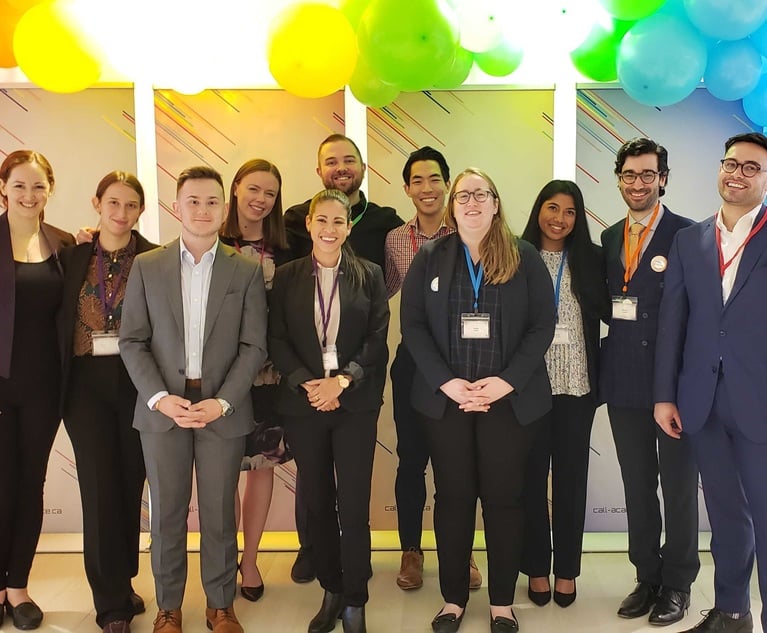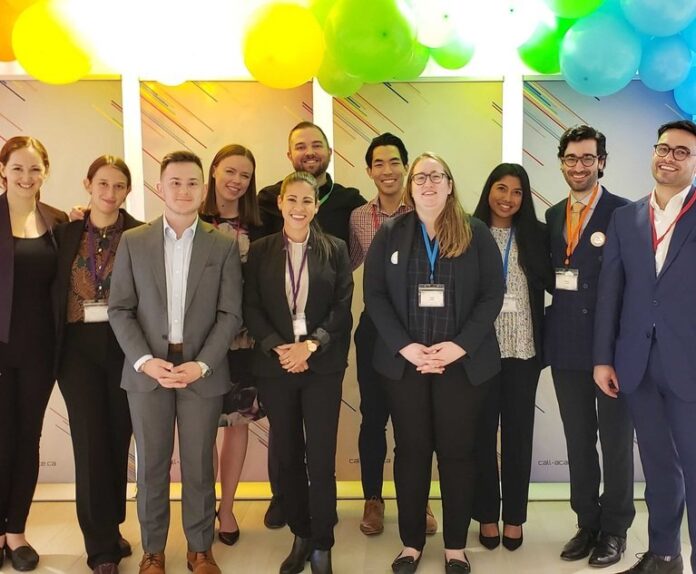
A judge started off her keynote speech by vowing she wasn’t going to cry. Another lawyer who’s no stranger to the Supreme Court of Canada and has helmed numerous massive class actions was also, as they, verklempt about it.
Other members of the bar who were called back in the 1990s and before were all equally amazed and impressed.
“This is unprecedented,” said Nova Scotia Judge Amy Sakalauskas. “I just can’t stress to you enough how much this means and it’s going to mean moving forward.”
What stirred up all this emotion among seasoned legal professionals? Prisme, the first LGBTQ2S+ (the lesbian, gay, bisexual, transgender, queer, and Indigenous 2-spirit community) law conference in Canada.
Canada is one of the most progressive countries when it comes to LGBTQ2S+ rights. It was the fourth country in the world to legalize gay marriage starting in 2003, having recognized same-sex “unions” since 1999 and including “sexual orientation” as a recognized ground for protection under the Canadian Human Rights Act in 1996. For the most part, the LGBTQ2S+ has it pretty good in Canada.
Yet, there hadn’t been an LGBTQ2S+ law conference until this past weekend. A conference that was remarkable not only for being the first but also because of who supported it and who organized it.
Back in 1998, I tried to write a story for a Canadian legal magazine about out lawyers at big law firms. It was a time of openness and increasing discussion about diversity and change. But not a single lawyer or partner from a whiteshoe Bay Street firm – Canada’s equivalent of a Wall Street firm – firm would talk about it. I could only get one young associate from a not-yet national firm and a couple of others from small and regional firms talk to me.
Last weekend’s Prisme conference, was not only sponsored by some of the largest law firms in the country including Borden Ladner Gervais, McCarthy Tétrault, Gowling WLG, McMillan, and U.S.-founded Weil, Gotshal & Manges but BLG gave over the conference floor on the 34th floor of its Toronto offices for the two-day event. The firms have supported diversity and Pride events for a few years but never an LGBTQ2S+ legal event.
There’s $300,000 or $400,000 a year “on the table for our community that we can use for events and distribute to people and actually affect a difference,” said Lucas Kilravey, an associate at Weil in New York who was at BLG in Toronto when he and a group of colleagues started organizing the conference a year ago.
And therein lies the second, and even more remarkable, aspect of the conference: it was organized entirely by junior associates and articling students who wanted to provide a space for discussing issues relevant to their communities and provide networking and other opportunities for young LGBTQS2+ lawyers to connect with each other and more experienced lawyers.
“I want everyone especially young, queer legal professionals, students, and those that have the intersectionality component to know that we’re here, and you can do whatever it is that you want to do,” said Veronica Blanco Sanchez, another organizer and an associate at Perley-Robertson, Hill & McDougall, a personal injury firm in Ottawa, Canada’s capital.
The conference was also the launching pad for the country’s first LGBTQS2+ lawyers’ association. While the Canadian Bar Association and its provincial counterparts have sections that focus on queer issues, there are still gaps that need to be filled and unlike those umbrella associations, Kilravey stressed again they “can get a significant amount of funding from firms” to underwrite events, awards, research, and other activities.
Optimism abounded over the weekend but there were sober reminders that nothing should be taken for granted and there is always work to be done—at home and abroad.
As Judge Sakalauskas said in her keynote, “we often forget our community has a very complicated and difficult relationship with the [legal and justice] systems in which we work.”
Referring to the systemic purging of gays and lesbians in the military, government, and federal police forces that only ended in the early 1990s, she noted, “this happened systematically in Canada with a timeline more recent than any of us would like to admit.”
Buggery laws that essentially criminalized gay male sex were only officially repealed from the Canadian Criminal Code in 2019 and a bill banning conversion therapy finally became law in January of this year, after two other failed efforts.
Same-sex couples can marry, they can adopt children, and generally have wide-ranging rights in this country, but speakers over the course of the two-day conference frequently noted that hard won rights are under fire globally and Canada is not immune.
Private American and Russian money “is flowing around the world funding religious groups” to push anti-gay legislation and intimidate and harass human rights proponents, said Doug Kerr, executive director of civil-society umbrella group Dignity Network Canada. Those “fighting against our rights” are aware of its global dimensions so it’s increasingly important to strengthen the global movements working to protect those rights.
He threw out one statistic that the total amount of global funding that goes “into the LGBTQ human rights space” is US$570 million. The total budget of the Christian Broadcasting Network, just one of the largest anti-gay groups in the world, is more than $600 million.








